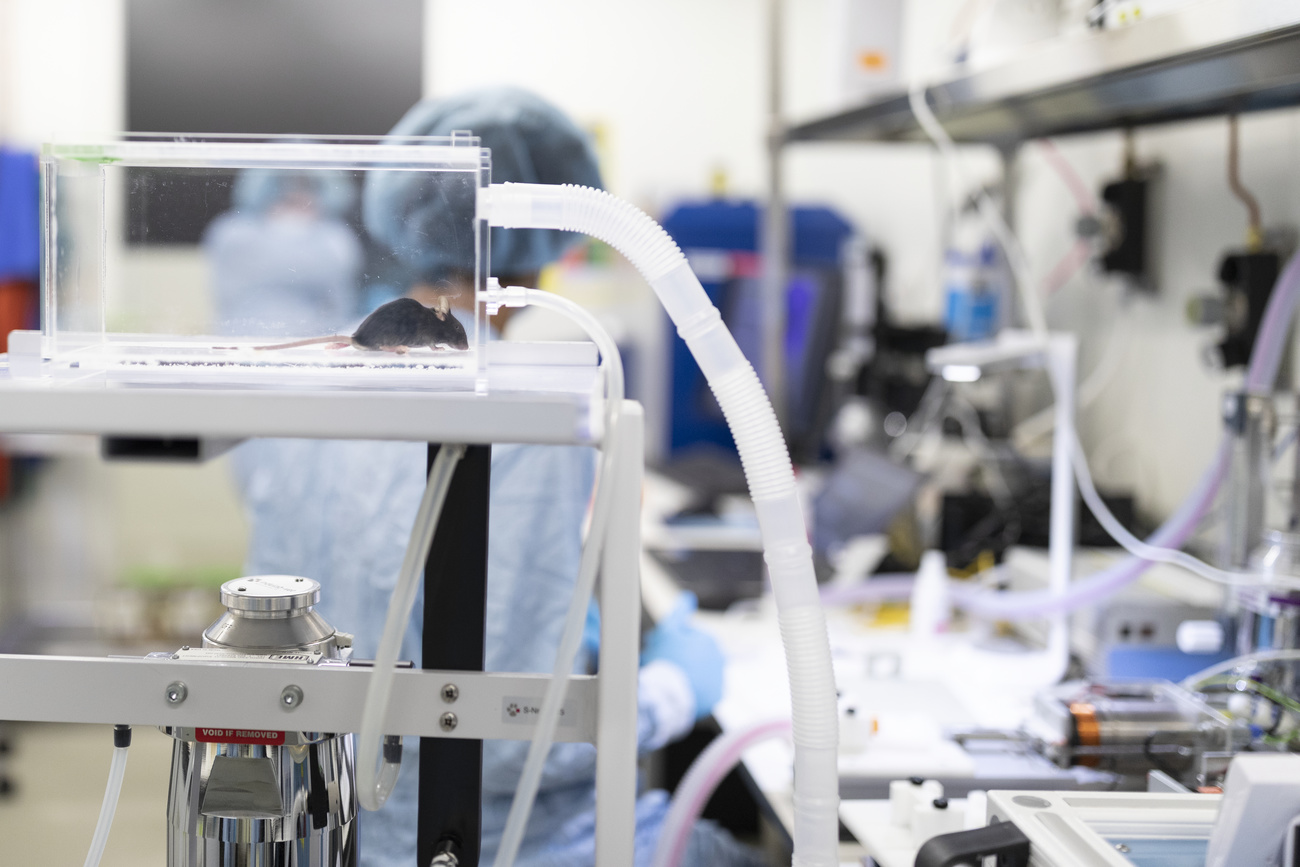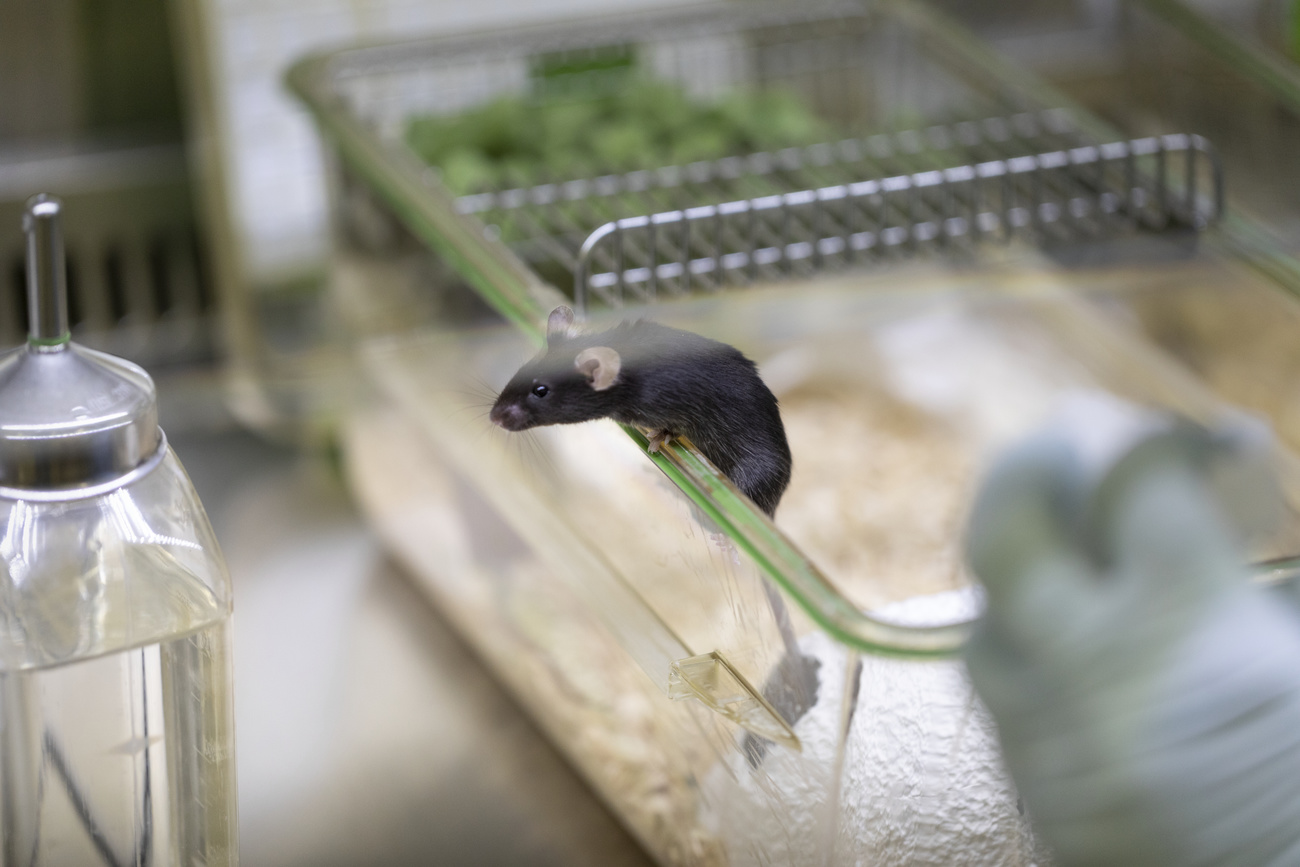Campaigners make another attempt to ban animal testing in Switzerland

Swiss politicians once again have to deal with the question of whether animal testing should be banned. The popular initiative “Yes to an animal-free future” has been submitted in Bern.
+Get the most important news from Switzerland in your inbox
The initiative is backed by the IG Tierversuchsverbots (Animal test ban)-Initiative. It submitted 127,622 signatures in Bern on Monday. Now the federal government and parliament will have their say. The initiators were responsible for a previous initiative to ban animal testing, which was rejected at the ballot box in February 2022.
‘Much more moderate’
They are now once again calling for an absolute ban on animal testing, but describe the new text as “much more moderate”. The new initiative wants to write a ban on animal experiments into the constitution and also prohibit the breeding of laboratory animals and the trade in animals for animal experiments.
However, the committee has abandoned two other demands from the initiative that were rejected in 2022: a ban on experiments on humans and a ban on the import of goods tested on animals.
‘Scientifically inadequate’
Studies show that animal testing is not only an ethically but also scientifically inadequate research method, writes the IG Tierversuchsverbots-Initiative in its press release. Some 95% of the drugs declared suitable in animal experiments do not work in humans.

More
Swiss voters reject ban on animal testing
In many cases, the initiators go on to write that side effects of medicines caused in humans are not recognised in animal testing. Cosmetics, on the other hand, are no less safe since they are no longer allowed to be tested on animals.
It is therefore recommended that instead of animal testing, tests should be carried out with “insensible measuring instruments” or with cell, tissue or organ cultures. This would eliminate the problem of false organisms delivering results that are usually not transferable to humans.
The text of the initiative also specifies how the ban must be implemented. If the initiative is accepted at the ballot box, experiments of the highest of the four degrees of severity will be prohibited and experiments for basic research and education will also be banned with immediate effect. All other experiments will be banned no later than seven years after the yes vote.
Warning from the scientific community
Representatives of the scientific community warned against the bans. These would jeopardise important fields of research, wrote Swissuniversities. Progress, innovation and education in human and veterinary medicine as well as in life sciences and biotechnologies would be made more difficult or impossible.
Strict conditions apply to animal experiments in Switzerland. Experiments are only authorised if there is no animal-free alternative.
Research on whole organisms is still necessary for the development of new cures, writes the Swiss National Science Foundation (SNSF). It points out that animal experiments could be carried out abroad following a ban in Switzerland. This would be at the expense of animal welfare.
Not the first initiative
Over the past forty years, Swiss voters have repeatedly had to decide whether to ban or restrict animal experiments. Prior to the 2022 initiative, corresponding referendums were already rejected in 1993, 1992 and 1985.
Almost 600,000 animals were used in animal experiments in Switzerland in 2023. This corresponds to an increase of 1.6% compared to the previous year. The Federal Food Safety and Veterinary Office (FSVO) announced in autumn that around two-fifths of animals were used in non-stressful animal experiments.
Some 91% of animal experiments in the severely stressful category were carried out to research diseases in humans, the FSVO wrote. More than half of the animals are used for research into cancer and neurological diseases. The most common animals were mice, birds, fish and rats.
Translated from German by DeepL/jdp
This news story has been written and carefully fact-checked by an external editorial team. At SWI swissinfo.ch we select the most relevant news for an international audience and use automatic translation tools such as DeepL to translate it into English. Providing you with automatically translated news gives us the time to write more in-depth articles.
If you want to know more about how we work, have a look here, if you want to learn more about how we use technology, click here, and if you have feedback on this news story please write to english@swissinfo.ch.

In compliance with the JTI standards
More: SWI swissinfo.ch certified by the Journalism Trust Initiative




















You can find an overview of ongoing debates with our journalists here . Please join us!
If you want to start a conversation about a topic raised in this article or want to report factual errors, email us at english@swissinfo.ch.